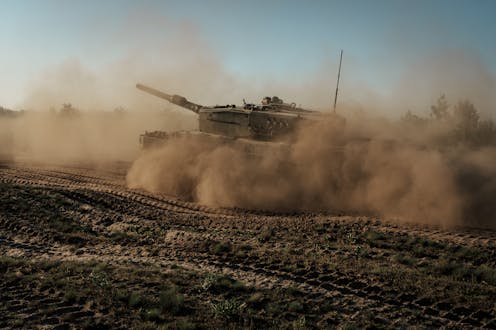The war in Ukraine is escalating and New Zealand will not escape the consequences
- Written by Nicholas Khoo, Associate Professor of International Politics, University of Otago

Russia’s war with Ukraine is now at a critical turning point. The relentless missile and drone strikes[1] on the capital Kyiv may look like a sign of strength, but appearances can be deceiving.
The Russian assault is a sign of weakness. It is an attempt to weaken Kyiv’s air defences in advance of a much-anticipated Ukrainian counteroffensive against Russian forces in Ukraine.
Earlier this week, a suspected Ukrainian drone attack[2] damaged two residential buildings in Moscow. If confirmed, this would be the first strike by Kyiv on a civilian area in Moscow.
BBC Russia editor Steve Rosenberg, whose own Moscow home windows shook during the explosions, reported feeling “as if the hostilities are coming much closer to home now”.
But this was not the first drone attack on Moscow. In early May, the Russian government reported that two unmanned aerial vehicles had unsuccessfully attempted to attack the Kremlin.
The clear concern now is that the war is escalating. And the repercussions will affect the United States-China relationship, as well as Australia, New Zealand and the South Pacific.
Diplomatic absence
As University of Chicago scholar John Mearsheimer wrote[3] in the journal Foreign Affairs in August 2022:
The maximalist thinking that now prevails in Washington and Moscow gives each side more reason to win on the battlefield so that it can dictate the terms of the eventual peace. In effect, the absence of a possible diplomatic solution provides an added incentive for both sides to climb up the escalation ladder.
Read more: Moscow drone attacks are a morale booster for Ukraine and a warning for Russia – here's why[4]
If this sounds alarmist, it shouldn’t. Does anyone doubt Vladimir Putin’s political (and possibly personal) survival rests on winning the first land war in Europe since the 1990s, one that directly involves NATO and Russia?
And does anyone doubt that NATO will not rest until its efforts in Ukraine secure Russia’s strategic defeat? That is the obvious interpretation of US Secretary of Defense Lloyd Austin’s April 2022 statement[5]:
We want to see Ukraine remain a sovereign country, a democratic country able to protect its sovereign territory. We want to see Russia weakened to the point where it can’t do things like invade Ukraine.
While we may be sympathetic to that statement, its escalatory implications are clear.
An escalation triangle
The current regime in Russia is arguably its own worst enemy. As Stanford historian Stephen Kotkin has written, Putin is repeating a pattern of failed modernisation and unsuccessful aggression that can be traced back to Tsar Peter the Great (1672-1725).
The savagery of the Russian campaign in Ukraine demands the scrutiny of an international criminal court. Whether this happens or not, history should teach us not to expect a consolidated liberal democracy to emerge from the ashes of the Putin regime. Indeed, the only thing worse than its continuation could be what replaces it.
Read more: How Russia might rethink its alliance with China after Putin[6]
Russia’s war in Ukraine has also escalated existing tensions in the US relationship with China.
If that relationship was adversarial before the Ukraine war, it is far more so now. The war has turbocharged Beijing’s view of US expansionism, and the US sense that it should press its advantage against its Chinese and Russian rivals.
Evidence suggests Beijing will do all it can to ensure the Putin regime’s survival, and eventually support the transition to a more restrained Russian leader who remains aligned with China.
Read more: Approach with caution: why NZ should be wary of buying into the AUKUS security pact[7]
NZ and the ANZAC alliance
These escalations are now being felt within Australia and New Zealand’s strategic environment.
In recent years, China’s leader, Xi Jinping, has made clear[8] that China’s “national rejuvenation” cannot be achieved without “reunification” with Taiwan. The present situation, he has said[9], “cannot go on [from] generation to generation”.
Since 2020, New Zealand’s sole alliance partner Australia has borne the brunt of a coercive economic and diplomatic sanctions policy initiated by China. Canberra responded with the ambitious 2021 AUKUS[10] initiative, a strategic technology-sharing partnership with the US and UK.
Read more: As Australia signs up for nuclear subs, NZ faces hard decisions over the AUKUS alliance[11]
China then escalated tensions by signing a security agreement with the Solomon Islands in May 2022. The operational details weren’t transparent but the strategic target was clear – Australia.
These developments profoundly affect New Zealand’s own security. This explains Minister of Defence Andrew Little’s announcement in April 2023 that Wellington is interested in hearing more detail about possible “pillar two[12]” participation in AUKUS.
One necessary casualty of the current era of conflict escalation is a worldview based on plentiful security and few hard choices. How far we have come from the benign era when New Zealand signed a free trade agreement with China in 2008.
References
- ^ drone strikes (www.theguardian.com)
- ^ suspected Ukrainian drone attack (www.bbc.com)
- ^ John Mearsheimer wrote (www.foreignaffairs.com)
- ^ Moscow drone attacks are a morale booster for Ukraine and a warning for Russia – here's why (theconversation.com)
- ^ statement (www.theguardian.com)
- ^ How Russia might rethink its alliance with China after Putin (theconversation.com)
- ^ Approach with caution: why NZ should be wary of buying into the AUKUS security pact (theconversation.com)
- ^ has made clear (www.xinhuanet.com)
- ^ he has said (baijiahao.baidu.com)
- ^ AUKUS (www.whitehouse.gov)
- ^ As Australia signs up for nuclear subs, NZ faces hard decisions over the AUKUS alliance (theconversation.com)
- ^ pillar two (www.stuff.co.nz)

















